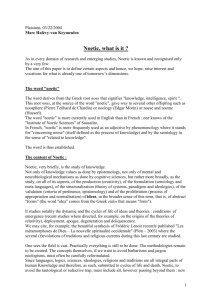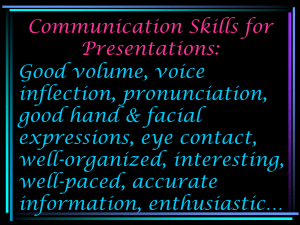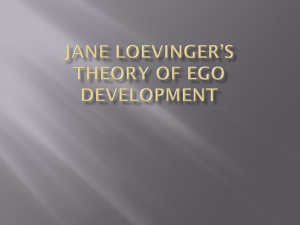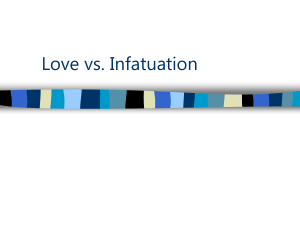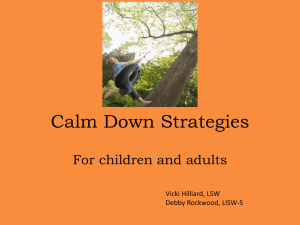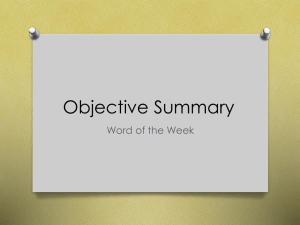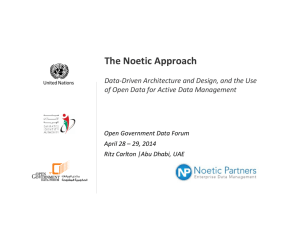animal knowledge
advertisement
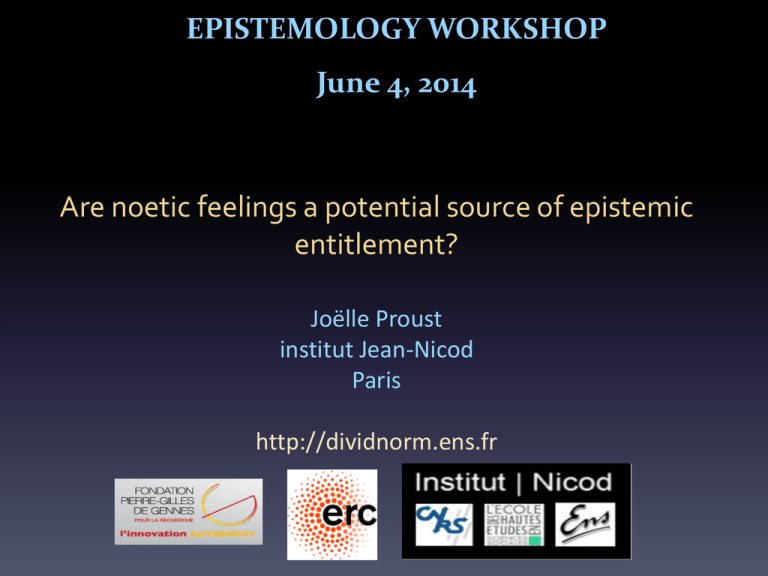
EPISTEMOLOGY WORKSHOP June 4, 2014 Are noetic feelings a potential source of epistemic entitlement? Joëlle Proust institut Jean-Nicod Paris http://dividnorm.ens.fr Outline 1. What is the epistemological puzzle raised by noetic feelings? 2. Epistemological externalism vs internalism about what counts as justification & knowledge 3. The epistemological status of noetic feelings: are they « virtues »? 1. What is the epistemological puzzle raised by noetic feelings? Noetic Feelings • Are experienced before and after an epistemic action, with a predictive or retrodictive-evaluative function They have the function of monitoring epistemic actions, such as trying to discriminate, remember, solve a problem, etc. First function : prediction & evaluation Consists in evaluating a gradient of likely correctness, which involves comparing an observed with an expected value. In Self-probing: they predict how feasible the cognitive action is, given a stored standard In Post-evaluating: they report how successful the action has been, given a stored standard Noetic Feelings Predictive Retrodictive cognitive effortfulness Feeling of being right Familiarity Feeling uncertain knowing Tip of the tongue about one’s own performance The embedded structure of cognitive action (CA) Epistemic action: Epistemic norm(s) Instrumental action: norm of utility 2 types of monitoring depending on one’s Cognitive action • Most cognitive actions are « reactively » monitored by noetic feelings. • Some important cognitive actions, however, can be « strategically » monitored by beliefs and plans of actions. Second function: motivation to form an epistemic decision Once a performance is appraised, noetic feelings are able to motivate a decision in agreement with a given graded appraisal (e.g., launch the cognitive action/accept or reject its cognitive output) An agent may, however, decide not to follow his/her feeling in making an epistemic decision Third function: epistemological ? • Noetic feelings seem to allow agents to reliably evaluate their epistemic states • Are they, however, a potential basis of agents’ being entitled to taking their perception, memory, etc. to be valid? • An argument against their epistemic role is that, although they influence epistemic decision, they are not based on the content of the state which they evaluate, contrary to the subject’s own experience. Feelings are blind to contents • Bayesian Hypothesis: The informational input for predictive « noetic affordances » consists in the structural, dynamic properties of the mind while it prepares to act mentally, or once it has acted, eg: • Processing onset, latency, intensity and increased coherence of cognitive activity over time predict cognitive success. Our puzzle • Noetic feelings are reliably predicting/evaluating success in an ongoing task in their own functional contexts • Outside the latter, they are a source of epistemic illusion. They motivate epistemic decisions in a swift, graded and economical way. • They are blind to the contents they seem to be about. Are they a source of epistemic entitlement? • To address this question, the issue of epistemological externalism vs. Internalism needs to be articulated. 2. Epistemological externalism vs internalism about what counts as justification & knowledge Entitlement vs Justification • Internalism: when a person knows a proposition, she does so on the basis of something such as evidence or good reasons • 3 forms of internalism: Knowledge presupposes – access to the basis of one’s knowledge – a justifying mental state – Fulfilment of one's intellectual duties or responsibilities. Entitlement vs Justification Externalism defends reliabilism •A belief is justified if, and only if, it results from a reliable cognitive source or faculty that tends to produce true beliefs. •Animals and small children have knowledge and thus have justified beliefs. But their beliefs can't be justified in the way internalist evidentialists conceive of justification they are « entitled » to know that P. Attempts at reconciling internalism and externalism through virtue epistemology Acquired cognitive character epistemic virtue The acquired intellectual virtues (or competences) are habits and dispositions that meet the reliabilist criterion of promoting true beliefs and minimizing false ones. For knowledge to be creditable to S it should be shown not be acquired by mere epistemic luck: if S knows P, then it ought not to be the case that S could easily have been wrong. The notion of the 'integration of a cognitive system’ (or epistemic virtue) has been proposed as a way of eliminating epistemic luck. "Belief amounts to knowledge when apt: that is to say, when its correctness is attributable to a competence exercised in appropriate conditions". (p.92) Sosa (2007) Two kinds of epistemic virtues • Those contributing to « animal knowledge » (AK) • Those contributing to « reflective knowledge » (RK) • One has AK if one's judgments and beliefs are direct (reliable) responses to perception or memory- with little or no benefit of reflection or understanding” [AK = apt belief] • One has RK if one possesses internal justification for believing that one is getting at truth reliably [RK is apt belief aptly believed to be apt.] Sosa (1991, 2007, 2009). 2 types of justification • Your belief that P is unreflectively justified just in case it is virtuously formed, that is, has its source in an intellectual virtue, unaided by reflection on your cognitive powers or circumstances. • Your belief that P is reflectively justified just in case you are justified in believing that it is virtuously formed. (reflective justification requires forming metabeliefs). Relativity of justification • Sosa’s proposal is that justification is relative to environment. Relative to our actual environment A, our automatic experiencebelief mechanisms count as virtues that yield “much truth and justification”. • Relative to a “demonic” environment, such mechanisms are not virtuous and yield neither truth nor justification. • Reflective justification involves developing, to a greater or lesser extent, a coherent “endorsing perspective” on your cognitive dispositions and environmental placement, which together determine how well justified your first-order beliefs are. (Turri on Sosa, 2013) What is the epistemic status of noetic feelings? Noetic feelings have an epistemic role, in the sense that they reliably influence epistemic decision. How can we characterize this role? – Do they offer a kind of internal access to one’s reasons for asserting that P? No: A feeling is not a reason. – Are they justifying mental states (like perceivig or remembering)? Not exactly: they do not have the proper kind of content. What is the epistemic status of noetic feelings? • Are they a virtue, i.e., a truth-conducive competence that a subject may have or fail to have, and that can be trained by performing the same kind of cognitive task ? • Yes! Several points, however, need to be specified. 3. The epistemological status of noetic feelings: are they « virtues »? 1 - Characterize the competence involved Do noetic feelings belong to the competences for acquiring: animal knowledge? reflective knowledge ? i.e. do they confer entitlement or justification? If noetic feelings were concerned with acquiring « animal knowledge », they would reliably register the world (present or past). However, they do not register facts (about the world or the agent) : cf. evidence of nonhuman evaluations of cognitive performance). Proust (2013) they merely evaluate whether animal beliefs are likely to be correct, which seems to indicate that they belong to competences involved in reflective knowledge If noetic feelings are taken to be « metabeliefs », i.e., beliefs through which an agent takes a perspective on the reliability of the faculties generating her belief, then they belong to higherorder virtues involved in reflective knowledge. Noetic feelings, however, are only inspiring metabeliefs in agents able to form them. In non-humans, they rather inspire the desire to act accordingly. These agents are not seeking truth in first-order calls, but merely reward of their action. If noetic feelings are taken to be « metabeliefs », i.e., beliefs through which an agent takes a perspective on the reliability of the faculties generating her belief, then they belong to higherorder virtues involved in reflective knowledge. Noetic feelings, however, are only inspiring metabeliefs in agents able to form them. In non-humans, they rather inspire the desire to act accordingly, with a belief like: « I can do it ». These agents are not seeking truth in first-order calls, but merely reward of their action. To summarize: Noetic feelings do not constitute animal knowledge, because they do not register facts in the world or in the self. They may contribute to reliably filtering out uncertain animal beliefs, in a context-sensitive way. They only contribute to reflective knowledge when they form the basis of meta-beliefs (unavailable to non-humans). 2. Reliability vs responsibility • Noetic feelings seem to be prima facie similar to the kind of competence presented by Norman the clairvoyant (Bonjour, 1980) .../ Norman the clairvoyant (BonJour 1980) • Norman, under certain conditions that usually obtain, is a completely reliable clairvoyant with respect to certain kinds of subject matter. He possesses no evidence or reasons of any kind for or against the general possibility of such a cognitive power, or for or against the thesis that he possesses it. One day Norman comes to believe that the President is in New York City, though he has no evidence either for or against his belief. In fact the belief is true and results from his clairvoyant power, under circumstances in which it is completely reliable. • If one is sensitive to the (partial) similarity between Norman’s clairvoyant states and noetic feelings, one might consider that even though an agent may recognize the reliability of her own noetic feelings, she should not take responsibility for using them competently. Why responsibility can be claimed 1. Noetic feelings need to be trained over time. Younger children are initially poor at evaluating their abilities to perceive or remember. In order to reach a better resolution and calibration, children must attend to their ongoing cognitive actions and their subsequent outcomes • Resolution: ability to discriminate relative accuracy, e.g. knowing which items are known better, which are known worse. • Calibration: the relation between level of confidence (intensity in noetic feelings) and correctness of the decision in the same cognitive action Why responsibility can be claimed • Agents can attend or fail to attend to: – the feedback of their own cognitive actions (generating or not calibrated feelings) (Stahl, Pieschl, S., & Bromme, 2006) – The contexts where using their own noetic feelings is adequate/ inadequate and illusory. Examples: • Producing a judgment of learning on the basis of present fluency (Koriat &Bjork, 2005). • Attributing own fluency in a task to others. (Nussinson & Koriat, 2008, Nagel 2012) Why responsibility can be claimed Noetic feelings are produced • when epistemically reacting to contexts (little effort, small stakes) (system 1 cognitive actions) • not when considering analytically one’s reasons to believe (system 2 cognitive actions) (effort, high stakes) It is the responsibility of a knower to adjust her effort to the importance of an epistemic decision. Proust (in print) Conclusion The epistemological status of noetic feelings To be reliable, noetic feelings must be • Well-calibrated: • Relevant to a given epistemic acceptance • Sufficiently informative for an appropriate decision to be taken. Noetic feelings do not constitute animal knowledge, because they do not register facts in the world or in the self. They monitor animal knowledge as well as some bits of reflective knowlege. They may become topics for reflective knowledge when they are redescribed in meta-beliefs and metarules (for example: « don’t trust your noetic feelings in such and such a context ») Training noetic feelings is a basic requirement for developing rational cognitive agency. Thanks for your attention Questions welcome !
